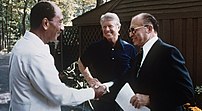 Image by DrewOtt via Flickr
Image by DrewOtt via Flickr
Israel has its own version of tailgating. It doesn’t have a fancy name (in general, barbecue is called Alla-Aish - and has nothing to do with the Arabic Alla or Aish. Actually, it literally means “on the fire”.) Anyhow, Alla-Aish often involves barbecuing on a traffic island by a highway.
Below - Alla-Aish from '69 and a more recent one.


I never got that either.
But sometime I enjoy imagining the following scenario. What would have happened if I had decided to build my home in the middle of the busiest highway in Israel? (for the Israeli reader, I usually think of the Halacha exit on Ayalon).
My day dreaming usually ends fairly quickly, realizing that I will soon find myself glued to a wheel of a track rotating at 65 mph.
But sometimes I think that perhaps the army will decide to protect me, build a wall around me, send hundreds of troops to make sure that violators do not disturb my privacy, and in general, making me feel very welcomed there, in my tent in the middle of the highway.
I often think that the settlers have the very same dream, only that no-one ever wakes them up.
In this post I do not argue whether Israel has the right over the west bank (for security, religious, historic, imperialist, or megalomanic reasons). Even if Israel has the right over the West Bank, I argue that the settlements are the dumbest thing ever (and pretty evil too).
The main highway in Israel, Ayalon highway, most certainly belongs to Israel. It is in the middle of Tel Aviv. Still, this does not give me the right to build my home there, since I put myself and my surrounding at risk. It is simply not reasonable. The biggest success of the settlements, in my view, is that somehow they were able to avoid the public discourse. In the Israeli public opinion, holding the occupied territories and building there settlements are the same thing. However, it is pretty simple to see that settlements impose nothing but risks, to everyone. Their existence kills people and kills the chance for peace.
Instead of giving the numbers or telling the stories, let me just share three videos with you. Kids, don’t try this at home. Actually, kids, don’t watch it. But grownups, you must watch these. It is our obligation as thinking people to know what is going on there. Not knowing lost its legitimacy after 1945.
The first is a story of a settler in Hebron.
The second is about Palestinians who try to harvest their olive trees, as instructed by the Israeli court and army. A story from the Israeli media.
The third goes back to the first family. This time a Palestinian kid tries to return home. Notice what the soldiers do, and how old the jewish terrorists are. I will probably not send my kids to their school.
These are only few examples. If you want to watch more, I recommend these two channels:
http://www.youtube.com/user/shovrim (operated by Breaking the Silence)
and
http://www.youtube.com/user/btselem (operated by B'Tselem)
Above all, the settlements are the main obstacle to the two states solution. As one of the settlers told reported Bob Simon on CBS’s 60 minutes: "I think that settlements prevent the establishment of a Palestinian state in the land of Israel. This is the goal. And this is the reality."
I am sure most of you already watched the excellent CBS report, but in case you missed it, here it is:
The following two maps were taken from Peace Now and demonstrate the dimension of this phenomena. On the left - the west bank (in blue -settlements; in brown - Palesitinan territories). On the right - the road blocks. Notice that almost all of them (actually, all of them but 35) are not between Palestine and Israel, and are a direct outcome of the wish to protect settlements. These are the same roadblocks that prevent kids from going to school, farmers from working their lands, and pregnant women from reaching the hospitals on time.


Even if we assume that peace cannot be reached, a conclusion I object, Israel has no right or reason to maintain the settlements. This is an immoral sin and imposes a risk to everyone in the region.
To start realizing the effect of the settlements and road blocks, I recommend a movie by Avi Mograbi, and one blog by a member of Machsom Watch. Thanks, Nina, for finding this blog. This blog traveled from Israel to Indonesia and back for me to find it. A person could have never completed that journey.
The Blog - Hebrew and English.
The movie: Avenge but One of My Two Eyes, by Avi Mograbi.
The "funny" thing is that official Israeli report recognizes that 75% of the settlements have illegal building procedures, and still the state of Israel lies openly:
“Israel's actions relating to the use and allocation of land under its administration are all taken with strict regard to the rules and norms of international law...Although the Hague Regulations, in Article 52, permit the administering authority to requisition private property for reasons of military necessity, Israel does not requisition private land for the establishment of settlements, even where there is military justification.“
Gentleman, we have created a monster.

![Reblog this post [with Zemanta]](http://img.zemanta.com/reblog_e.png?x-id=d780c3f2-ab41-45eb-8638-d9a64fe064ae)


![Reblog this post [with Zemanta]](http://img.zemanta.com/reblog_e.png?x-id=5687734e-1a49-4535-8d20-78d5d7fa53d2)





